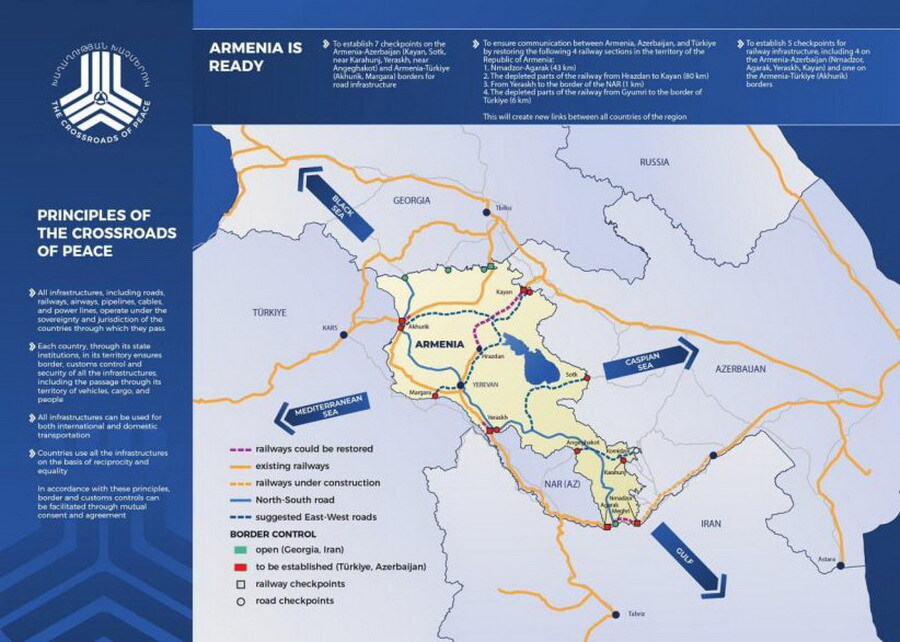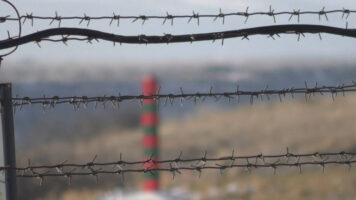Baku has implemented the minimum plan: Imitation of peace or real agreement?
29.04
2025
A month and a half after the so-called “peace agreement” was reached, there is, in fact, no progress in ratifying this document, and for a month and a half, Azerbaijani fire continues along the border.
Baku has fulfilled its minimum plan. Without delving into the procedural meaningless texts of the document, which state that the two countries are ready to cooperate within the framework of international law, recognize each other’s territories, and similar phrases, let’s highlight three main issues:
- The issue of Artsakh has not been addressed, despite international organizations’ resolutions stating that any agreement between Armenia and Azerbaijan must be comprehensive and effective, including the Nagorno-Karabakh issue. For example, in the Jan. 18, 2023 report of the European Parliament on the 2022 annual foreign and security policy, it is stated that the Parliament believes the peace treaty “must address all major causes of the conflict, including the rights and security of the Armenian population in Nagorno-Karabakh, and the return of displaced persons and refugees under the supervision of the UN.” In other words, according to international organizations, the agreement should reflect the issues of the Artsakh Armenians, which the Armenian authorities oppose.
- Armenia must renounce legal claims and demands against Azerbaijan in international courts.
- Thus, Armenia has been an occupier for 30 years, “seizing” territories that do not belong to it, for which it will have to pay for decades. Issues regarding prisoners and other security concerns are also not addressed.
Azerbaijan will not sign a peace agreement with Armenia not because its pacifist ambitions are questionable, or because it has territorial ambitions over Lake Sevan, Syunik, or Tavush, but because the Armenian leadership lacks a stable and long-term guarantor of peace. Nikol is weak, has lost wars, and has failed in negotiations; peace is made between the strong. Otherwise, it would be a unilateral capitulation, not real peace. At the same time, let us note that Armenia’s unilateral capitulation will be a heavy burden for Azerbaijan, which Baku understands very well. This document, at best, will be a memorandum of a temporary freeze of the conflict. Only when Azerbaijan becomes convinced that there is a person in power in Armenia with sufficient, at least not 10 percent legitimacy, that Pashinyan’s successor is not at least politically unbalanced, and it will be ridiculous to talk about Western Azerbaijan, including Sevan, Syunik, Ararat, Tavush, and all of Armenia, will Aliyev realize very well that such ambitions will further sink Azerbaijan into the mire of external dependence, and that the Armenian people will never allow Azerbaijan to openly occupy Armenian territories, let alone open a corridor under its terms. This is the logic of real politics and strategic analysis. If there is no government with a clear plan regarding the nation’s and state’s fate, if the national consciousness of the Armenian people does not prevail, then Azerbaijan will implement its plans. But Aliyev and his entourage are well aware that serious agreements cannot be made with the current Nikol Pashinyan government because they are deceptive. Instead, they are trying to create the image of a scared victim through psychological pressure and media terror, so they can later keep the “stick” in their hands. With the announcement of the so-called peace, Baku pocketed a very important document: the agreement on the text of the peace agreement. Azerbaijan expects no small territorial gains, such as a few kilometers in Tavush or elsewhere. It is not interested in delimitation or demarcation but has only one main goal: to force Pashinyan to change Armenia’s Constitution, removing any reference to the Dec. 1, 1989 Declaration of Independence of Armenia, which proclaimed the reunification of Soviet Artsakh with Mother Armenia. Another key point is Turkey’s aim to annul the Armenian Genocide and property rights.
The policy of the authorities should be viewed within this logic. It’s no coincidence that Pashinyan stated that “the new Constitution of Armenia will have a regional content.”
The description of the regional significance of the Constitution is a masterpiece; simply put, the adopted constitution in Armenia should be acceptable to the countries of the region—particularly Turkey and Azerbaijan. This is also a small step in a larger game, aiming to make Turkey the police officer or manager in this region and to serve as the guard of the West in any major move or change. Currently, Turkey plays this role to some extent: it is Azerbaijan’s supporter, has significant influence over Georgia’s investment portfolio, and has a loyal government in Armenia. Turkish influence is limited here because of two main obstacles: Iran and Russia. Thus, if the West manages to weaken Russia’s role in Armenia even further through Pashinyan, then conquering this market for Turkey would not be that difficult.
This means we need to change the Constitution, abandon national goals, ambitions, the presence of Russian border guards, or European observers because Azerbaijan desires it. Then we will see whether Turkey and Azerbaijan will be willing to open the border, and it’s evident how beneficial the border opening is for us and for them. And all this is called diplomacy? It is axiomatic that strength is necessary for success in foreign policy, but it is not sufficient. The question arises: What is Armenia’s foreign policy resource, where does its strength lie, and to whom does that strength belong, which is to be used to counterbalance or balance the growing Turkish-Azerbaijani pressure and influence? How will Armenia navigate this complex situation? Let’s try to describe:
- The Trump administration will significantly cut funding,
- Europe itself has financial problems,
- Russia is well aware of why we are reducing the anti-Russian trajectory, and why we are sending emissaries to Moscow one after another,
- As a last resort, to get out of this situation, we will remove the EU monitors from the border and implement Article 9 of the November 9 document—signed by Nikol—and transfer control to the FSB.
Is this Armenia’s foreign policy? Is this how Armenia’s diplomatic position is being strengthened? Or is all this just a cover-up for a deeper process?
Comparison parallels: Let us note that the Constitution is primarily a set of principles and goals expressed through a political process, and the end of a constitution acceptable to the region is the fate of Bashar Assad. In 2011, Assad faced a difficult choice—Russia-Iran or Arab countries-Turkey—meaning Russia-Iran or the West. Over 13 years, he tried to evade this multiple times because of the fight against the Islamic State (IS), a terrorist organization.
The U.S. needed the Kurds and Assad, that’s why they tolerated him, but once that threat disappeared, Assad was no longer needed. He was secretly negotiating with the Americans to prevent his and his family’s billions from being frozen in Western banks, favored Iran in the presidential palace, and ceded the country’s wealth to Moscow, trying to calm Russian geopolitical jealousy. He was secretly exchanging intelligence with Turkey, and ultimately, he became a victim of regional constitution or politics, when regional countries decided Assad’s and Syria’s fate.
A sharp change in foreign orientation leads to security collapse, chaos, armed clashes among civil groups, bloodshed, civil war, and the risk of territorial disintegration, along with violence and massacres against the people. We saw all this recently in Syria, where, according to various reports, 2,500–4,000 Alawites were killed. The Sunnis, apparently, were avenging the loss of power after 50 years. The genocidal style, at least, is not purely Syrian but Ottoman.
Meanwhile, Turkey is burying the Kurdish national issue in Syria, with transitional President Ahmed al-Sharaa, also known as Abu Mohammad al-Julani, signing a historic agreement with the largest Kurdish group, which ostensibly preserves Syria’s territorial integrity but in reality aims to disarm the Kurds and expand Turkish hegemony. al-Julani is Turkey’s political son, a former leader of Jabhat al-Nusra (Al-Qaeda’s Syrian branch). The U.S. offered a $10 million bounty for him, but this was canceled because he had more important tasks.
And how to make his image as a terrorist acceptable and understandable to the civilized world: first, change his military uniform, make him wear a tie, popularize him through the media as a president who ensures peace and security, and dispel the idea that Al-Jolani wanted to declare a caliphate in Syria a few years ago and himself become the emir or caliph. President Sharaa signed an agreement consisting of 8 principles with Mazloum Abdi, the leader of the largest Kurdish military-political group in Syria.
With only three important points, that agreement does not solve the national problems of the Kurdish people, but enshrines the general principles of full enjoyment of civil and constitutional rights. The second important point of that agreement contains a key term, “Kurdish population in Syria”, meaning that the Kurds do not have a national problem in Syria, meaning that the US is closing the Kurdish national page in Syria and making it clear that the Kurds are a key minority in Syria and, like others, will not enjoy a special status, but the rights defined by constitutional and civil law norms, as Aliyev is trying to do toward the people of Artsakh, at best.
It is also interesting to consider the following question: Why didn’t the West condemn the Latakia incidents? Because, in that case, it would have given an opportunity to Russian, Iranian, and Iraqi Shiite groups, Hezbollah, to reactivate in Syria and hinder U.S. plans. And Washington’s play was quite impressive and very interesting—it killed two birds with one stone. To finally weaken Russia’s and Iran’s positions in Syria, it destroyed Latakia and its residents, while simultaneously forcing Julani to call for accountability for those responsible for the Latakia and Tartus incidents—even the closest ones—to punish them with his own hand. In other words, they are weakening the Russians and Iranians, and temporarily legitimizing Julani, who considers himself a caliph. Later, most likely, they will remove him from the scene or neutralize him, or reduce his group to a secondary role, like a “reserve” in the field. The game is quite large, on a grand scale, and the dark clouds mainly revolve over Iran, that is, over our region.
Recently, Ayatollah Khamenei stated that Washington is “imposing new demands” on Iran, and that these demands “will not be accepted unconditionally” by Iran. Meanwhile, Trump has resumed his maximum pressure campaign against Iran, which he started during his first term, aiming to bring Iran’s oil exports to zero until Washington itself controls the export and sale process. Let us also not forget that the suspension or reactivation of Iran’s nuclear program will be decisive for the South Caucasus as well. Tehran has significantly increased its nuclear activities over the past year. Since early 2025, Tehran has accelerated uranium enrichment up to 60%, very close to the 90% standard, which is the level of weapons-grade material. This deeply concerns the U.S., Turkey, Azerbaijan, Israel, and positions everyone against Iran.
The U.S. is considering weakening Iran’s positions in Syria, Lebanon, and Iraq to force it to focus on nuclear weapons, because in such a case, Iran will see its nuclear potential as a shield against Israel and the U.S. They are pressuring Iran, forcing it to wrap itself in nuclear issues and enter negotiations. Meanwhile, an interesting event is unfolding: Washington wants to grant Moscow the status of a negotiating mediator, to influence Tehran’s stance as much as possible and soften hardened positions in nuclear talks. Why does the U.S. assign this role to Russia, when the Ukraine conflict has not yet been fully resolved? Russia and Iran have declared strategic and allied relations, yet both have been almost left out of the new security architecture in Syria, both have conflicting interests in the Middle East and South Caucasus. In this case, Washington is involving both in the game, pushing tough conditions, then withdrawing from negotiations, and solving two problems—it is burning Russia’s mediating card and presenting Iran as an uncooperative negotiator. And if during this time anti-government protests rise again in Iran or a demand is made to change the tough and rigid position in the negotiations, that is, to oppose Ayatollah’s position, then the creation of an unstable situation inside Iran will become inevitable. In that case, the U.S. will tighten its anti-Iranian sanctions, worsen the country’s economic situation, and foster potential social unrest, which essentially has political and geopolitical motives.
Washington and Tel Aviv are well aware that anti-Iranian pressures must not cross a red line, so Iran does not declare that it is withdrawing from the Non-Proliferation Treaty. Nevertheless, we believe Iran will avoid uncontrollable escalation because engaging in conflict with a state like the U.S. means playing with fire recklessly.
From Syria to Iran, from Ukraine to the South Caucasus—everyone is awaiting the Putin-Trump talks. Dozens of packages are interconnected on the table, and the fate of many will be decided there. We cannot ignore the fate of other regions or the ongoing events there. They will directly influence our country, and the ball is now in the court of Nikol Pashinyan and his political pillar, the Civil Contract party, which must be held accountable at least before the court. But the Civil Contract has a golden opportunity to throw off the noose that is tied around Nikol’s neck and not to give legal force to the circus called the peace process. In order not to burden the coming years of the state of Armenia and the Armenian people, and not to lose statehood, there is only one solution: to deprive Pashinyan of all functions of acting on behalf of the Republic of Armenia. If there are still people in the Civil Contract who feel connected to Armenian identity, who understand and empathize with the state and national goals, they should have the courage and stop the sunset that the leader of their pack is taking with pleasure.





